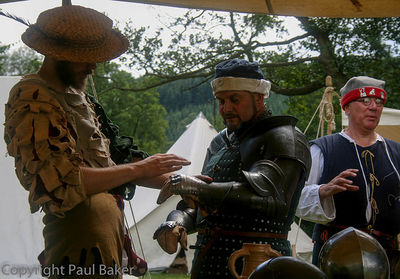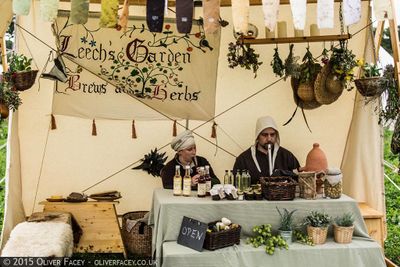The Marches economic interests
Wildwinter (talk | contribs) (Created page with "Agriculture is the basis of wealth in the Marches. Even a modest holding produces an income that allows its yeoman to live comfortably. With some improvement, a Marcher farm c...") |
(→Billet) |
||
| (60 intermediate revisions by 15 users not shown) | |||
| Line 1: | Line 1: | ||
Agriculture is the basis of wealth in the Marches. Even a modest holding produces an income that allows its yeoman to live comfortably. With some improvement, a Marcher farm can pay for luxuries and imported goods. Marcher fields and orchards feed people across the Empire. Trade surplus in the form of cured and preserved meats, | {{CaptionedImage|file=Haggling.jpg|caption=Traders trade at market towns and local fairs.|width=400|align=right}} | ||
==Overview== | |||
Agriculture is the basis of wealth in the Marches. Even a modest holding produces an income that allows its yeoman to live comfortably. With some improvement, a Marcher farm can pay for luxuries and imported goods. Marcher fields and orchards feed people across the Empire. Trade surplus in the form of cured and preserved meats, flitches of bacon, barrels of beer, bushels of fruit and vegetables, sacks of flour, tanned leather and bales of wool travels from one side of the Empire to the other, purchased by intermediaries from [[the Brass Coast]] or [[The League]]. | |||
Many of these traders come initially to one of the many small but important [[Market Towns|market towns]] that dot the landscape. The first market rights were established by Imperial charter, and towns with these rights are outside the direct control of the households. | |||
===Alder=== | |||
The inhabitants of a market town appoint '''alders''' (also sometimes ''aldermen'') to represent the town. In most cases these folk are wealthy merchants of the town. However their ranks may also include prominent town folk such as a friar or blacksmith who lives in the village. Those market towns that employ their own militia usually raise the captain to the rank of alder. | |||
__TOC__ | |||
The name itself is sometimes assumed to be a corruption of ''elder'' but in fact is a very old reference to the [https://en.wikipedia.org/wiki/Alder alder] tree whose presence is known to be good for the fertility of soil. The metaphor is obvious; the alders (and by extension the market towns) are good for the farms and the farmers helping them improve their prosperity in a symbiotic relationship. | |||
Many alders take great pride in their ceremonial chains of office, sometimes referred to as "Chains of Prosperity". Several towns maintain a healthy level of competition in providing the most magnificent chain for their representatives, and some go so far as to commission them as magical items, such as an [[Alder's Edge]]. | |||
===Market Town=== | |||
Most [[market town|market towns]] are small, little more than a few score houses on either side of a main street. The Imperial charters prevent a market town being established within a full day's travel of an existing market town but competition and rivalry between market towns is at least as fierce as that between rival households. Because the market towns lack a stake in the political process, they are forced to rely on neighbouring households to represent their interests. While most Marcher folk see this as right and proper, a life of honest toil on the land being superior to a life spent haggling for every last silver, alders often have a rather different view. | |||
{{CaptionedImage|file=Herb Business.jpg|width=400|align=right}} | |||
At the heart of almost every prosperous market town is an inn. These large structures are often fortified, with a wall surrounding the building and adjacent compound. Merchants visiting the town will usually eat and sleep at the inn but so will visiting yeomen bringing their goods to market, unless they have relatives who live in the town. Only Meade is large enough to support more than one inn, so the quality of the food and drink provided by a town's inn can have an impact on the prosperity of the whole town, as foreign merchants may avoid those towns whose inns have a bad reputation. | |||
The innkeeper is almost invariably an alder of the town and can be one of the wealthiest members of the community. They are often also the best informed; inns tend to be hotbeds of gossip, with news and information being bought and sold as regularly as the drinks. | |||
{{Anchor|Granaries and Storehouses - the Imperial Breadbasket}} | |||
==The Imperial Breadbasket== | |||
The three northern territories of the Marches - [[Bregasland]], [[Mitwold]], and [[Upwold]] - are dotted with public buildings referred to as a whole as the ''Imperial Breadbasket''. These granaries, barns, warehouses, gain silos, and storage houses are maintained by the civil service, and overseen by the [[Keeper of the Breadbasket]] who makes any important decisions regarding their bounty. They exist to ensure that the [[farm|farms]] of the Marches are prepared to meet any potentially disastrous setbacks such as poor harvests or wide-scale curses. They were completed just before the Spring Equinox 381YE. Any Marcher farm-owner can make use of their services, and at a reasonable price. The [[great work]] they represent was created as a result of the disasters that beset the nation in 379YE and 380YE. | |||
==Billet== | |||
Any Imperial [[general]] can order their troops to [[Army orders#Billet|billet]] in any of Mitwold, Mournwold, Bregasland or Upwold, supported by the breadbasket. The [[opportunity]] to [[Home_fires#A_Meal_and_a_Bed|create this special order]] arose as the result of a [[mandate]] enacted by Friar John of the Mourn following the Spring Equinox 383YE. If the breadbasket were extended to cover other [[the Marches|Marcher]] [[territory|territories]], the billet order could be taken there as well. | |||
The order was extended to Mournwold in Spring Equinox 386YE after a [[386YE_Spring_Equinox_Senate_sessions#Fund_the_Drummers_of_the_Drakes|Senate motion]] reinstating [[Pride_of_the_Marches#Drake's_Due|Drake's Due]]. | |||
{{The Marches Links}} | |||
* [[Keeper of the Breadbasket#History|Keeper of the Breadbasket]] - details the history of the Imperial Breadbasket | |||
[[Category:The Marches]] | [[Category:The Marches]] | ||
[[Category: | [[Category:Archetype]] | ||
Latest revision as of 12:49, 22 May 2025
Overview
Agriculture is the basis of wealth in the Marches. Even a modest holding produces an income that allows its yeoman to live comfortably. With some improvement, a Marcher farm can pay for luxuries and imported goods. Marcher fields and orchards feed people across the Empire. Trade surplus in the form of cured and preserved meats, flitches of bacon, barrels of beer, bushels of fruit and vegetables, sacks of flour, tanned leather and bales of wool travels from one side of the Empire to the other, purchased by intermediaries from the Brass Coast or The League.
Many of these traders come initially to one of the many small but important market towns that dot the landscape. The first market rights were established by Imperial charter, and towns with these rights are outside the direct control of the households.
Alder
The inhabitants of a market town appoint alders (also sometimes aldermen) to represent the town. In most cases these folk are wealthy merchants of the town. However their ranks may also include prominent town folk such as a friar or blacksmith who lives in the village. Those market towns that employ their own militia usually raise the captain to the rank of alder.
The name itself is sometimes assumed to be a corruption of elder but in fact is a very old reference to the alder tree whose presence is known to be good for the fertility of soil. The metaphor is obvious; the alders (and by extension the market towns) are good for the farms and the farmers helping them improve their prosperity in a symbiotic relationship.
Many alders take great pride in their ceremonial chains of office, sometimes referred to as "Chains of Prosperity". Several towns maintain a healthy level of competition in providing the most magnificent chain for their representatives, and some go so far as to commission them as magical items, such as an Alder's Edge.
Market Town
Most market towns are small, little more than a few score houses on either side of a main street. The Imperial charters prevent a market town being established within a full day's travel of an existing market town but competition and rivalry between market towns is at least as fierce as that between rival households. Because the market towns lack a stake in the political process, they are forced to rely on neighbouring households to represent their interests. While most Marcher folk see this as right and proper, a life of honest toil on the land being superior to a life spent haggling for every last silver, alders often have a rather different view.
At the heart of almost every prosperous market town is an inn. These large structures are often fortified, with a wall surrounding the building and adjacent compound. Merchants visiting the town will usually eat and sleep at the inn but so will visiting yeomen bringing their goods to market, unless they have relatives who live in the town. Only Meade is large enough to support more than one inn, so the quality of the food and drink provided by a town's inn can have an impact on the prosperity of the whole town, as foreign merchants may avoid those towns whose inns have a bad reputation.
The innkeeper is almost invariably an alder of the town and can be one of the wealthiest members of the community. They are often also the best informed; inns tend to be hotbeds of gossip, with news and information being bought and sold as regularly as the drinks.
The Imperial Breadbasket
The three northern territories of the Marches - Bregasland, Mitwold, and Upwold - are dotted with public buildings referred to as a whole as the Imperial Breadbasket. These granaries, barns, warehouses, gain silos, and storage houses are maintained by the civil service, and overseen by the Keeper of the Breadbasket who makes any important decisions regarding their bounty. They exist to ensure that the farms of the Marches are prepared to meet any potentially disastrous setbacks such as poor harvests or wide-scale curses. They were completed just before the Spring Equinox 381YE. Any Marcher farm-owner can make use of their services, and at a reasonable price. The great work they represent was created as a result of the disasters that beset the nation in 379YE and 380YE.
Billet
Any Imperial general can order their troops to billet in any of Mitwold, Mournwold, Bregasland or Upwold, supported by the breadbasket. The opportunity to create this special order arose as the result of a mandate enacted by Friar John of the Mourn following the Spring Equinox 383YE. If the breadbasket were extended to cover other Marcher territories, the billet order could be taken there as well. The order was extended to Mournwold in Spring Equinox 386YE after a Senate motion reinstating Drake's Due.
Further Reading
Core Brief
Additional Information
- History
- Leadership
- Military concerns
- Economic interests
- Religious beliefs
- Magical traditions
- Hearth magic
- Territories
- Children
- Music
- Archetypes
- Groups
- Egregore
- Keeper of the Breadbasket - details the history of the Imperial Breadbasket

